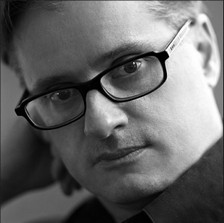
Gérard Pesson (1958, France) studied literature and musicology at the Sorbonne and at the Conservatoire National Supérieur de Musique de Paris. In 1986 he founded contemporary music journal Entretemps. He spent two years in Villa Medici in Rome as a fellow of the French Academy. Awards: Laureat du Studium Internationale de composition de Toulouse (1986), award of the Opéra Autrement (1989), award of the Tribune Internationale de l’Unesco (1994), and Prize of the Fondation Prince Pierre de Monaco (1996). Numerous ensembles and orchestras in Europe performed his pieces. The opera Forever Valley commissioned by T&M, with libretto by Marie Redonnet was performed in April 2000 at the Théâtre des Amandiers in Nanterre. His diary Cran d’arrêt du beau temps was published in 2004 (Éditions Van Dieren). Opera Pastorale, after L’Astrée d’Honoré d’Urfé, commission of Stuttgart Opera, was performed in May 2006 (produced in June 2009 at the Théâtre du Châtelet of Paris). Pesson’s work has been published since 2000 by Éditions Henry Lemoine. The first CD edition completely devoted to his performed by the Fa ensemble was published in 1996 (Accord/Una corda), and Mes béatitudes with Ensemble Recherche in 2001 (aeon). The recording of the opera Forever Valley appeared in 2003. In 2007 Pesson received a prize from the Berlin Akademie der Künste. Since 2006 he teaches composition at the Conservatoire National Supérieur de Musique de Paris.
The change of destiny for Gérard Pesson happened when he became resident of Villa Medici in the early nineties (1991). Mes Béatitudes belong to the newly found centre of gravity (1991-1995). Mes Béatitudes is a reflection on German music, silent dialogue with Helmut Lachenmann via Anton Bruckner. The piece is profoundly dialogical and implicates real partnerships. The literature is a vital part of Pesson’s music, it’s its core. Moving in Villa Medici, Pesson let Italian poet Sandro Penna enter his life. Penna’s style is concise, avoiding any unnecessary ‘fioratura’. “Concrete instrumental music” that Lachenmann sought, finds its echo in Penna’s concrete poetry. Mes Béatitudes (1995) together with Gel par jeu (1991) and Récréations françaises (1995) forms the trilogy of memory, theater of sound shadows, evocation of mani.
Gérard Pesson’s music does not whish to change the world, but rather to reveal it, to simply lay it bare. In Mes Béatitudes Pesson uncovers Bruckner’s Seventh symphony, directing his musical attention primarily to the fragility of the adagio’s second theme.
(CD Alternance/Pesson-Lanza STR 33837 www.stradivarius.com)
Omer Corlaix


